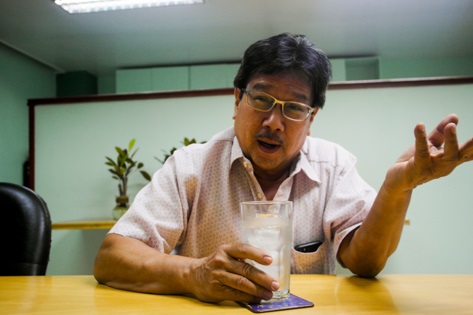
By MARIA FEONA IMPERIAL
(Conclusion)
THE decade 1975 to 1985 could be considered the golden years of the Metro Manila Film Festival, when it produced such classics as Ganito kami noon, paano kayo ngayon by Eddie Romero, Minsa’y isang gamu-gamu by Lupita Kashiwahara, Ina ka ng anak mo by Lino Brocka, Kisapmata by Mike de Leon, Himala by Ishmael Bernal and Brutal by Marilou Diaz-Abaya.
These days, the MMFF is associated with films that recur every year in a seemingly endless loop, at one point featuring the same stars and themes that hardly reflect the original objective: “To encourage quality film production both in substance and in form.”
One of the differences between then and now—aside from the quality of the films produced—is that all the MMFF’s proceeds used to go to the film industry rank and file, benefiting and invigorating the thousands of nameless behind-the-camera workers.
From 1975 to 1985, the sole beneficiary of the MMFF proceeds was the Movie Workers Welfare Fund (Mowelfund), a foundation established in 1974 to provide aid to movie workers “in times of sickness, disability, accident and death.”
Mowelfund’s annual share from the MMFF used to be around P16 million, enabling it not only to provide for its members’ medical and health needs, but also to send at least 10 scholars to prestigious film schools abroad, according to Mowelfund education director Edgardo Vinarao.
The 70-year-old Vinarao considers the 1980s to be the best years of Mowelfund, when it would receive homage from renowned film scholars it sent abroad and from the countless movie workers who had sought financial assistance to send their children to school, their spouses to work, and themselves to the doctor for chronic pains.

Even if the film industry didn’t pay much, he said, Mowelfund was able support thousands of movie workers because funding from the annual MMFF, the highest-earning film festival in the country, was sufficient.
Last year, Mowelfund survived on only P6 million from the MMFF, barely enough for the almost 5,000 movie workers who rely on it for health services and other benefits their unstable movie jobs could not provide.
Caught in a tight budget, the seven-story Mowelfund hub in Quezon City is a shell of what is once was, with no homecomings of successful filmmakers taking place and no movie workers paying frequent visits. Only half of the dimly lit building is being used, with some of its office spaces now leased for commercial purposes.
One of the reasons Mowelfund has been getting less from the MMFF over the years is that the festival rules are constantly changing, depending on who sits in the MMFF and the Metro Manila Development Authority.
In recent years, the changing rules have resulted in a smaller allocation to Mowelfund which now shares the proceeds with other film industry groups, and in amounts that have been dwindling.
On top of that, the MMFF fund intended for beneficiaries is also used for other expenses.
The MMFF has two sources of funding: tax revenues or amusement taxes, and non-tax revenues.
Tax revenues come from the amusement taxes theater owners would have normally paid to local government units. But for MMFF’s 10-day run from Dec. 25 to Jan. 5, Metro Manila’s local government units waive the amusement taxes in favor of MMFF beneficiaries.
Under a 2010 directive from the Office of the President, Mowelfund should get half of the collected tax revenues from the MMFF. The remaining half is divided among the Film Academy of the Philippines, 20 percent; Motion Picture Anti-Piracy Council, 20 percent; Film Development Council of the Philippines, 5 percent; and the Optical Media Board, 5 percent.
In recent years, though, these beneficiaries say they have not been getting their full share of tax revenues from the festival, forcing them to hold horseracing contests, fun runs and golf matches to raise funds.
Meanwhile, the MMFF’s non-tax revenues are supposed to come from the bonds, royalties and penalties incurred from participants in the festival.
MMFF executive committee member Dominic Du said the MMFF no longer generates non-tax revenues. In the early years of the festival, he said, contributions, donations and sponsorships were enough to cover operating expenses.
But times have changed. “For the past few years, it’s been difficult. The sales are bad,” Du said.
Because of this, the MMFF is forced to draw on the tax revenues even for its operating costs and prizes, taking from what should go to movie industry beneficiaries.
The Commission on Audit says the MMFF’s tax revenues should be deposited in trust for its beneficiaries and are subject to government audit. The non-tax revenues, meanwhile, are supposed to shoulder the operating costs, prizes and awards.

When a certain film applies for a slot in the festival, its producers are required to pay a certain fee, said MMFF spokespeson Marichu Maceda.
Once selected, every participant must give a bond of P750,000. Should they back out before the festival starts, the amount will be forfeited by the MMFF for “depriving somebody else who could have gotten in of that slot,” Maceda said.
Created by President Ferdinand Marcos in 1975 to foster “cultural awakening under the New Society” during the martial law years, the festival was first called the Metropolitan Film Festival, and was timed for around Sept. 21, the anniversary of the declaration of martial law.
The festival was organized “in recognition of the value and importance of the local movie industry in the overall developmental effort for the country, a fitting celebration to encourage quality film production both in substance and in form, as well as provide incentives to the performing artists and the technicians in the industry,” according to Proclamation 1533, one of the many edicts Marcos issued in relation to the film festival.
The proclamation also created an executive committee that would oversee the festival, which eventually came under the Metro Manila Commission (MMC).
The MMC had legislative and regulatory functions in the then newly constituted Metro Manila area, with former first lady Imelda Marcos as governor, and the late Ismael Mathay as vice-governor. It would be later renamed the Metro Manila Film Festival, and would go through many evolutions through the different presidential orders issued in relation to it.
In 1990, Marcos’ successor, Corazon Aquino, renamed MMC to MMDA. IN 1995, Congress enacted Republic Act 7924 creating the present MMDA, an administrative unit governing the towns and cities of Metro Manila. The MMDA has since implemented and organized the MMFF.
The constantly changing MMFF rules have resulted in an inconsistency in delivering proceeds to intended beneficiaries, and in what is believed to be the use of the MMFF fund for other purposes. At one point in 2009, Sen. Jinggoy Estrada even delivered a privilege speech exposing how part of the MMFF fund allegedly went to then MMDA chairman Bayani Fernando as cash gift for his birthday.
The unending controversies over the MMFF have prompted calls for the transfer of the festival’s management to Mowelfund from the MMDA. In the 15th and 16th Congresses, Estrada and other lawmakers filed bills giving Mowelfund control of the festival. These bills have not been approved.
MMFF spokesperson Marichu Maceda said private entities like Mowelfund can’t do it alone.
“There have always been groups within the movie industry who feel that it is they who should be running the festival,” she said. “What they don’t know is that you will need the influence of the government to run this successfully.”
Maceda said the role of the MMDA in the festival is crucial, especially in seeking cooperation among Metro Manila mayors in the donation of amusement taxes.
She also said the “biggest stakeholders” of the festival are the theater owners and producers. “We cannot run this fest without the cooperation of theater owners. You have to be on good terms with theater owners, otherwise, you can be pulled out from the festival,” she said.
However, FAP president Leo Martinez said the festival has long been under the control of theater owners and producers who make the most profit.
For the next two weeks, Filipino films will again dominate the screens in Metro Manila. But for the nameless ones who helped put them there, the movie workers in charge of the dirty work, it is a question of when their plight would take center stage—or if it ever will.
“It’s pitiful how those who are hoping for benefits do not get them,” said Vinarao. “At a time when the nation is impoverished, the film industry is earning much. Why don’t they give it to the poor?”

